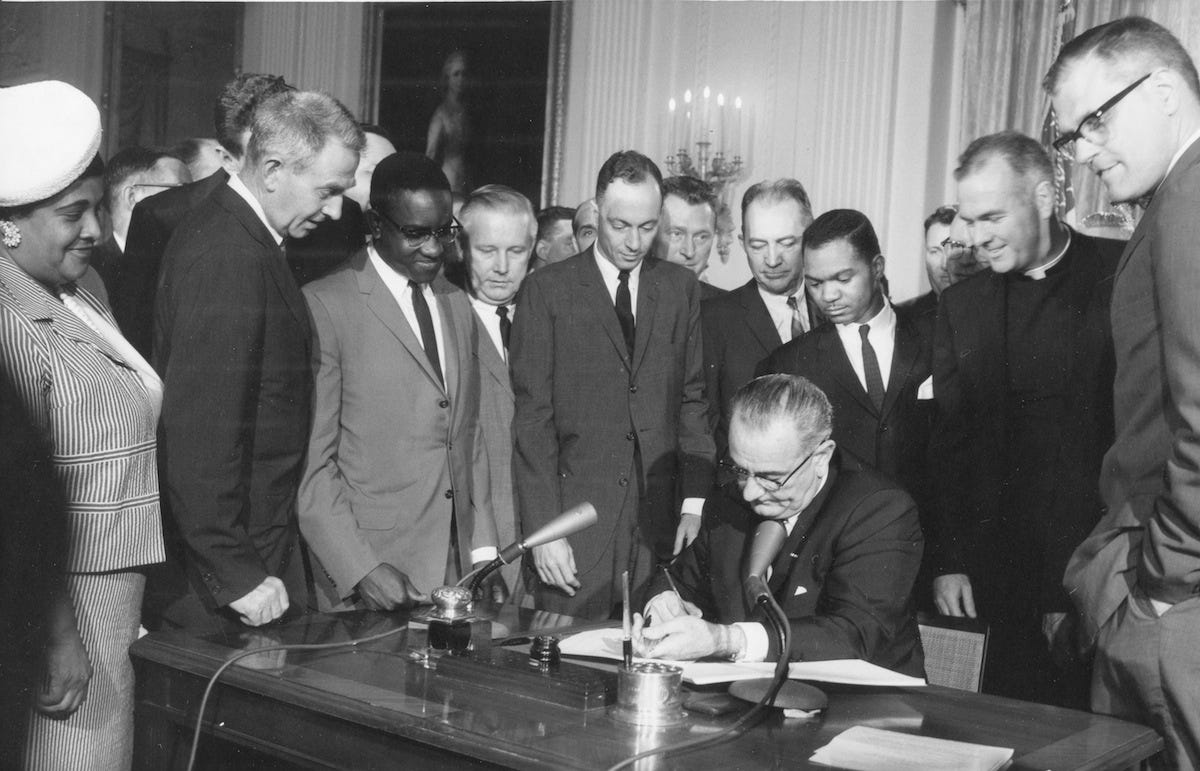Bill Moyers was an aide to Lyndon Johnson and a fellow Texan in whom the president confided. Moyers was with Johnson on the day the president signed the Civil Rights Act of 1964. “When he signed the act he was euphoric,” Moyers recalled afterward, “but late that very night I found him in a melancholy mood as he lay in bed reading the bulldog edition of the Washington Post with the headlines celebrating the day. I asked him what was troubling him. ‘I think we just delivered the South to the Republican party for a long time to come,’ he said.”
Moyers published this recollection decades after the fact—and after Johnson’s prediction came true. Historians have tried to find a version closer to the event, to no avail. Maybe things happened as Moyers said. Maybe Moyers’ hindsight embellished Johnson’s foresight.
Yet none doubted Johnson could have said it. No president had a keener sense of politics than Johnson, and on no subject were his senses keener than on race and the South. Johnson grew up in Jim Crow Texas. He recognized how segregation and the inferiority it imputed to blacks deprived them as individuals of opportunity and thereby stunted the development of the South as a whole.
It also set a ceiling on what white politicians could aspire to. Richard Russell was a mentor to Johnson. The senator from Georgia had the talent and ambition to be president. But the politics of his region held him back. “Jim Crow put a collar on more smart men as sure as if they were sentenced to a chain gang in Georgia,” Johnson told Moyers. “If Dick Russell hadn’t had to wear Jim Crow’s collar, Dick Russell would be sitting here”—in the White House—“now instead of me.”
The Jim Crow collar—the disqualification of Southern politicians in the eyes of the national electorate on account of segregation—had threatened Johnson. He understood how hard it would be to become president while identified with the South. This understanding had influenced his acceptance of John Kennedy’s courtesy offer of the second place on the 1960 Democratic ticket. Kennedy assumed Johnson would rather remain majority leader in the Senate. But Johnson grabbed the chance to change his identification. Rather than senior senator from Texas, he would be introduced as vice president of the United States, should the ticket win. After a few years of this, the collar might loosen enough for Johnson to pry it off.
He didn’t have to wait that long. Kennedy was assassinated and Johnson entered the White House through the side door.
His entry resolved a Catch-22 in American politics. A Southerner couldn’t be elected president so long as Jim Crow ruled the South. But Jim Crow’s grip on the South couldn’t be shaken until a Southerner was president. Southerners wouldn’t stand being lectured to on race by some Yankee. The message of change would have to come from one of their own.
Johnson made the most of his opportunity, and of all the persuasiveness and guile he’d sharpened during his time in Congress. Kennedy had sponsored a civil rights bill that was getting nowhere when he died. Johnson took up the bill and cast it as a fitting memorial to the martyred president. Coordinating with black leaders—some of whom reflexively distrusted him as a white Southerner—he beat back a Southern filibuster in the Senate and guided the bill to passage.
The Civil Rights Act of 1964 forbade racial discrimination in workplaces, education, housing, public accommodations and other areas of public life. Its passage set the stage for approval of the Voting Rights Act of 1965, which put federal enforcement into dismantling the impediments that had been erected in the South against black voters.
The two laws transformed the South. Blacks entered myriad venues of public life from which they had been barred. Black candidates were elected to office throughout the region.
White candidates benefited too. Freed of the Jim Crow collar, Southerners became electable to the highest office in the land. From 1848 until 1964, no candidate from a state that joined the Confederacy was elected president. But after that they were common: Johnson in 1964, Jimmy Carter in 1976, George H. W. Bush in 1988, Bill Clinton in 1992 and 1996, George W. Bush in 2000 and 2004.
Meanwhile the South turned Republican. The region had long been conservative, but residual resentment against Republicans for the Civil War and Reconstruction had kept it Democratic. The role of Johnson and the Democrats in banishing Jim Crow gave conservative Southerners permission to leave the party of their granddaddies for the party that suited them better philosophically.
The transformation took a few decades, but by the mid-1990s the once solidly Democratic South had become predominantly Republican. In fact, the South became the stronghold of Republicanism.
The arrival of the Southern conservatives made the Republican party uncomfortable for liberals, who migrated in the opposite direction, to the Democrats. The consequence was an intensification of the partisan divide in America. Until the 1960s each party had contained both liberals and conservatives. By the late 1990s, the Democrats were entirely liberals and the Republicans uniformly conservatives.
The crucial votes on the Civil Rights Act of 1964 included substantial numbers of both Democrats and Republicans. Besides turning the South Republican, that act helped make such bipartisanship nearly impossible in the twenty-first century. If Johnson saw this coming too, his views weren’t recorded.

